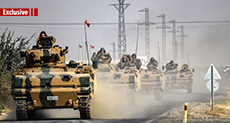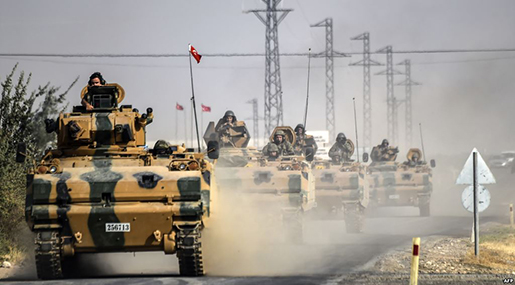
The Major Players in the Syrian Conflict Settle into their New Roles

Darko Lazar
Before delving into the latest developments in Syria, a scrutiny of US Vice President Joe Biden's short visit to Turkey is in order.

The first senior US government official to arrive in Turkey since last month's botched coup, which Ankara openly blamed on US-based cleric Fethullah Gulen and his Washington backers, was intended to smooth relations.
Instead, Biden's visit - described by the pro-Erdogan Daily Sabah as a "wasted trip" - helped showcase the acrimony between the two NATO 'allies'.
From the time he stepped off the plane, where he was met by a low-level delegation headed by the deputy mayor of Ankara, Biden's trip seemed ill-fated.
And a compilation of somewhat apologetic proclamations by the US vice president, including assurances that Washington had no prior knowledge or role in the July coup attempt, did not help much either.
Chiming in during a joint presser with Biden, President Recep Tayyip Erdogan accused Gulen of operating a global terrorist network from the US state of Pennsylvania and demanded his immediate arrest.
Biden's frustrations with such statements became increasingly apparent.
"A court of the United States has to conclude there's probable cause to extradite. How long it will take will depend on what evidence is presented. Thus far, until yesterday, there has been no evidence presented about the coup," Biden said as he tried to blame the US justice system for Washington's inability to extradite Gulen back to Turkey.
Of course, the prospect of the Americans ever giving up Gulen remains highly improbable. For decades, the cleric has operated under his Hizmat movement, serving as a lever for US intelligence operations across the Middle East and Central Asia. Apart from making Washington look weak in the eyes of its allies, Gulen's extradition would not only harm US intelligence assets but also American interests in the region, which can hardly be considered compatible with those of Turkey.
And then there is the issue of Syria's Kurds, which lies at the heart of that incompatibility.
Ankara has made no secret of the fact that it considers the US-supported Syrian Democratic Forces (SDF) - the bulk of which comprise fighters from the Kurdish People's Protection Units (YPG) - the greatest threat to emerge out of the Syria quagmire.
Ankara fears that if the Kurds gained the 98-kilometer stretch of land between Syria's Jarablus and Azez, they would establish an autonomous region for themselves along the Turkish border.
However, Turkey's concerns have been falling on deaf ears in Washington for years.
That is until Biden flew into Ankara to announce that the US is prepared to drop its support for the Syrian Kurds unless they pulled back beyond River Euphrates. In an attempt to reassure Ankara, Biden said that the Kurds, "cannot-will not-under any circumstance get American support if they do not keep that commitment."
Biden's announcement came shortly after Turkey had already launched its military incursion into Syria, dubbed operation "Euphrates Shield", which is reportedly being supported by US airstrikes, reconnaissance and intelligence.
But the deputy chairman of Turkey's Patriotic Party, Yunus Soner, told me that the mainstream media is intentionally exaggerating the American role in the operation.
"We don't think that it has US cover," Soner said. "If [Turkey's military incursion into Syria] had US cover, they would have started the operation after Biden's arrival. [Turkey's leaders] would appear in front of the cameras together with Vice President Biden and they would have declared it jointly and strongly; that is how these things are usually done."
The Turkish official goes on to explain that differences between Ankara and Washington, when it comes to the Kurds, are anything but resolved.
"What the US is now trying to do is to control the scope of the operation, and that is why they officially declared their support, but in reality, this is a huge conflict that will develop in the coming days," Soner adds.
The head of Turkey's SESA Institute of Political, Social and Economic Studies, Bilal Sambur believes that, "if the Turks cross the line and advance against Manbij and fight the Kurdish forces, there will be a big crisis between the US and Turkey."
Given the current realities on the ground, it is highly unlikely that either Turkey or the US would change their position towards Syria's Kurds or that any agreement between the three sides would be adhered to.
The Americans know full well that in the game of attaining geostrategic objectives, someone always has to lose.
As such, Biden's threats to end US support for the Kurds can hardly be considered credible. Instead, Washington's supposed U-turn is likely to be part of an American effort designed to manipulate the current situation in its favor.
The Situation in Syria
Turkey's direct military involvement in Syria is undoubtedly well planned, and in all probability, long-term.
On August 24, the Turks invaded the small Syrian city of Jarablus. The fact that the Daesh terror group handed the city over without a fight goes a long way in clarifying Ankara's real objectives. After all, the Turkish government failed to raise the slightest objection to the presence of Daesh in Jarablus, before the US-backed SDF began scoring major military victories along the border region.
Ankara's true strategic objectives in northern Syria include: 1) the establishment of a so-called ‘security' corridor along the 98-kilometer stretch of land between Jarablus and Azez; 2) The prevention of the unification of three Kurdish cantons under the leadership of the YPG; 3) The creation of a zone designed to protect Turkey from another wave of Syrian refugees; 4) Propping-up the so-called Free Syrian Army in order to add a local element to its military presence.
At first glance, Turkey's intentions may appear alarming.
But Ankara's decision to send its troops across the border followed weeks of diplomatic activity, involving both Iran and Russia.
The absence of a sharp response from Moscow suggests that Turkey's military action in Syria was likely agreed to during Erdogan's recent meeting with Russia's President Vladimir Putin in St. Petersburg.
Russia's reaction was constrained to a statement from the country's Ministry of Foreign Affairs, in which it expressed "deep concern". In diplomatic language, this essentially means, "proceed with caution."
Meanwhile, Tehran has remained completely silent. Of course, if a Russian/Iranian/Turkish agreement on Syria does indeed exist, its biggest test will be Aleppo.
Understandably, Turkey's new military venture received a much more vocal condemnation from officials in Damascus, who called it a violation of Syria's sovereignty. But even the reaction from the Syrian government can be considered as being rather muted.
If this were truly regarded as a military invasion by a neighboring country, one would expect to see the head of state make an urgent public address. The Syrian President Bashar al-Assad is yet to make any such appearance.
In all likelihood, Damascus has already received assurances from Ankara that its military operation would be limited to resolving the "Kurdish problem" and would not be directed towards Aleppo.
And very few in Damascus will lose any sleep over what happens to the Kurds.
Earlier this week, the YPG wrested almost full control of Syria's northeastern province of Hasaka, following days of deadly clashes with Syrian troops.
For the first time since the start of the conflict, Syrian fighter jets bombarded positions held by the US-backed Kurdish militias. The escalation played right into the hands of the Pentagon, prompting the Americans to scramble their own aircraft in what could have marked the first direct US attack against the Syrian military.
To make matters worse, another one of the Syrian government's archrivals has reportedly reached out to the Kurds. According to the Lebanese newspaper, Al-Safir, Saudi Arabia has established contacts with the YPG, offering the militia financial support.
Nothing about the current situation in Syria implies that there is an end in sight to the nearly six-year-long conflict. But the recent flurry in both diplomatic and military activity suggests that the conflict's major players are cooking up something big. The recipe is still unknown, but one of its ingredients involves a direct Turkish military role, and perhaps the most unlikely of alliances.
Source: al-Ahed News



